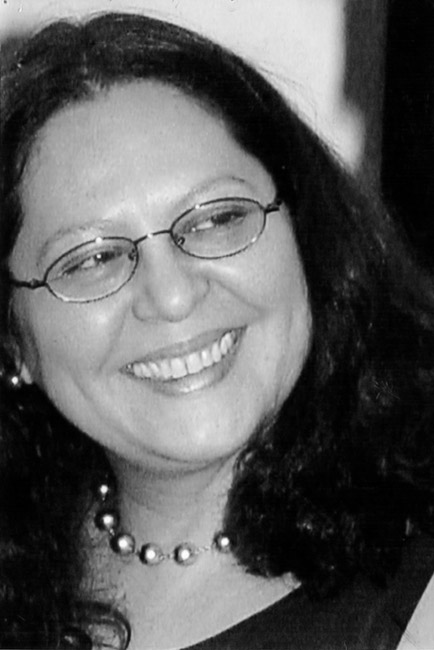In Memoriam
Celebrating the Life of María Torres-Guzmán (1951-2018)María Torres-Guzmán 1951-2018

MARÍA TORRES-GUZMÁN 1951-2018
María Torres-Guzmán, una mujer de su tiempo, an activist scholar whose research and teaching addressed social justice issues en su comunidad y en el mundo, focusing on language and cultural freedom, has left us with a rich legacy of stories, writings, articles and books.
María died in Madrid on August 8, 2018 her family announced her death was from a year-long battle with cancer. She is survived by her husband Juan Carlos Olivas Del Pozo, her querida madre Catalina Guzmán, daughters Nydia María Zamorano- Torres, and Helena Olivas, three grandchildren, Aramis James Woodard, and Adrián and Amelie Bender. As well as hermanas/os, sobrinas/os, tías/os, y primos.
Born on March 3 of 1951 in Puerto Rico, el orgullo de Juana Diaz, María was a trailblazer all her life, no se conformó con ser la primera ella misma, the first in the family to gain a higher education, the first Puerto Rican woman to gain tenure at her university, but always opened doors and made sure she brought others along.
A prolific story eller of Boriqua/Maori spirit, she incorporated the rich linguistic and cultural traditions of her native Puerto Rico in much of her scholarly work, at a time when this was not fully appreciated, opening new lenses for the study of Latinx and linguistic minorities. María was a scholar who embraced theory to understand culture in novel ways. Often employing Chicana and other feminist theories to promote the use of charlas y testimonies as a legitimate methodology and later in her work referred to the results as luchas exposed. She aimed to empower children and teachers, by reflecting the richness of their work and knowledge by co-creating research studies to examine their complex realities. Later in her life María experimented with other sociocultural theories such as cultural historical activity theory alongside social imagination, and stimulated bodies of research from other scholars in this direction.
From her early work in San José, California, about participatory democracy, parental attitudes and bilingual education, which became her Ph.D. thesis (Stanford University, 1982) to her last published work on bilingual teacher identity (2017), María discovered and re-imagined new ways of knowing. Bilingual and dual language education in New York City public schools, especially PS 84 and 165, was transformed with the collaboration of María. In discussing the difficulties she encountered in doing scholarly work in pursuit of bicultural knowledge, María said, “I kept seeing worlds that academia doesn’t even acknowledge.” Her pursuit of bicultural knowledge took her all over the world from China, New Zealand, Basque Country in Spain, Brazil and many other communities, but it was her work with the Latino communities in the U.S. that she always returned to with urgency.
María Torres-Guzmán had a long career in higher education starting in 1972 in the Chicano-Boricua Studies Program at Monteith College, Wayne State University (Detroit, Michigan). After studying in Puerto Rico and in Michigan, she earned her Master of Arts and Doctor of Philosophy at Stanford University (California), where she graduated in January, 1983. In the early eighties, she was parent educator specialist at Intercultural Development Research Association (IDRA) in San Antonio, Texas. In 1986, she was appointed as assistant professor at Teachers College, Columbia University in New York City in the Program in Bilingual/Bicultural Education. María remained at Teachers College for the rest of her academic life until she retired as a full professor in 2013. She was the first Puerto Rican woman in Teachers College to receive tenure as well as promotion to full professor. The Program in Bilingual/Bicultural Education was shaped by her leadership and her don de gentes, as she made everyone feel welcome, valued, and professionally brave and strong. She was a leader in supporting and mentoring emergent academics through testimonios, or knowledge-sharing, through informal conversations between generations of Latina scholars.
Como luchadora she toppled cultural barriers by collaborating with colleagues across departments at Teachers College and abroad to further strengthen her work for social justice and equality. All this while, she battled and survived her first cancer. As María put it,
What I know is that my presence has made a difference for many students and there have been generations of them. I feel there is a lot to be proud of, even though it sometimes feels that I have not done enough. At Teachers College, I feel that I have made a difference by persisting on things, by voicing my thinking and feelings, and so forth … I will leave, not the program I found, but a much broader embrace of the concepts that I have been dealing with for so long. There is a bigger program in teacher preparation, with three rather than two institutionally funded positions; there is a speech pathology bilingual certification, there is an interest in language policy in another department, and there is talk about an early childhood extension. There are many other people who are central to the doings that built these programs but my persistence has had an impact.
During her years in New York, María was invited as speaker, consultant, and visiting professor to universities all around the world extending her legacy and her sense of world community. All this while she fought her first battle with cancer, which she was able to beat and which stayed away for so long.
All this while she fought her first battle with cancer, which she was able to beat and which stayed away for so long. When María retired from Teachers College in 2013, her scholarly life was celebrated with a conference titled, Culture, Language and Identity Conference. At the time, her scholarly writings were numerous with five books, several edited journal volumes, and more than 50 journal articles and other publications. Her latest book was the 2009 Freedom at Work published by Paradigm Press. She continued to write and published to the end of her life with several manuscripts left in progress. Her legacy is extensive, rich and essential for any scholar in education, and in particular in bilingual education.
María received numerous awards and recognitions and was nominated for so many others. Some highlights include nominations for the Outstanding Young Woman of America award in l984 and l979; the Distinguished Scholar award from the AERA Committee on the Role & Status of Minorities in Educational Research and Development in 1989; the 2001 Education Award from the Puerto Rican Cultural Institute; and, most recently, the 2011 AERA, Lifetime Achievement Award, from the Bilingual Education Research SIG, and the 2011 AERA, Mentoring Award from Division K. María was generous with her time and knowledge and shared these in informal mentoring, with former students, Latina scholars and leaders. as well as formal mentoring contributions she made through educational associations. She was one of the designers of the mentoring program for the AERA Bilingual Education Research SIG, and participated in this until her illness took her away. She also mentored through the Cultivating New Voices program of the National Council for the Teachers of English since 2002.
Una amiga y colega, Carmen Mercado, describes María as,
…a guerillera, a woman warrior, an Adelita. María battled injustices at all cost, and has lived life to the fullest, on her terms. Although her accomplishments are many, I believe that María’s greatest accomplishment is her daughter Nydia… the little girl who appears on the cover of the book Bertha Pérez and María co- authored long ago is now the image of her mother. She is all that one may wish for in a daughter, at her mother’s side to comfort her, just as María had done long ago. María’s second greatest accomplishment and joy is her grandson Aramis (Carmen Mercado, e-mail communication, August 8, 2018).
Colleagues and friends around the world are saddened by María’s untimely departure. A departure sprinkled with admiration and love for María since the times when she was a feisty talented graduate student in the Mid-west actively engaged in bringing awareness to the injustices faced by Latina/o. Hers has been a productive and inspiring life and we will draw comfort on the memories.
Part of her family and friends gathered in Madrid on August 9, 2018 for her cremation, after which they took her ashes to her beloved Puerto Rico.
A celebration of her life will take place a year after her passing (August 8, 2019) in Puerto Rico.
María, you will not be forgotten.
In lieu of flowers, please donate in María’s memory to Amnesty International using the link, https://www.amnestyusa.org/
To notify the family of your donation and send them a short message, please use the following information:
Nydia María Zamorano-Torres
1526 Porter Circle
Rochester Hills, MI 48307
USA

